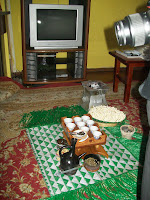After our trip to Durame, we went back to the Care Center and had a going away party for the kids. It was nice, and we enjoyed seeing the kids and nannies together. They brought each of the kids out, one at a time, dressed in traditional Ethiopian garb.
It was a brief, but very special ceremony. They reminded us of the close relationship between Christian history and Ethiopian history. They asked for a volunteer to read a verse from the bible, Exodus 2, that tells the story of Moses being "adopted" by Pharoah's daughter. I read the story, then gave a brief prayer for the children, families and staff of Holt and other agencies doing great work in Ethiopia. Then we sang "Happy Birthday" (not exactly sure why) and shared some cake and Ethiopian coffee (with popcorn, as always). Not long after that, it was time to say goodbye.
It seemed to me, the event was as much for the nannies as for the kids, and that made me glad. Watching them all say goodbye showed just how much they care for the kids. All of them knew Tommy; he'd been there the longest of anyone.
We spent the next four days hanging out at the Jemimah House. It was an interesting experience, with seven families, 18 adults and 12 kids. Although we were allowed to leave, we weren't allowed to "wander" out in town with the children. So, it sort of felt like being in quarrantine. Still, we had a very nice time hanging out with our new friends. The kids did extremely well and the staff at the Jemimah House did a superb job. Not sure which was a bigger hit: the daily coffee/popcorn ceremony, the hotel's van, the injera or the hotel's security guard.
SOME OBSERVATIONS ABOUT ETHIOPIA & OUR EXPERIENCE:
- Ethiopia is FAR AWAY, and getting there takes time, patience and money.
- The Ethiopian people are beautiful, warm and gracious.
- The country is a study in contrasts: poverty vs. wealth, development vs. stagnation, indulgence vs. austerity, high tech vs. plain, luxurious vs. stark.
- Capitalism has a foothold, but it's got a long way to go, especially outside the cities.
- The countryside, views and experience are very much like you expect from the movies and magazines. Africa looks a lot like you think it does. There are plains and savannahs, watering holes and scrub. Animals roam the streets and plains (so do young children).
- It's hot, although not as hot as I thought it would be while we were there. But we did get sunburn; it's much closer to the equator, so the sun seems much stronger.
- Water, especially clean water, is a luxury.
- "Doctor" is a fairly flexible, and relative, term.
- Pizza and beer tastes the same the whole world over.
- Ethiopian people have a lilt to their elocution; all discourse ends a tone or two higher than it began, and most sentences end in "eh?"
- 7 hours on the road takes on a whole new meaning at 160 Km/Hr...on a semi-paved surface...dodging live animals, carts, motorcycles and people.
- The number of families that need our help is even larger than I thought.
- 10 years in The Marines does little to encourage pleasant sight-seeing, and a great deal to identifying safety zones, positions of enfilade and defilade, lack of force dispersal, and lousy head facilities.
- Children and families are the primary casualties of poverty, followed closely by dignity and hope...and then toothbrushes.
- Injera will take a while to become my favorite Ethiopian meal. Right now, it's coffee and popcorn.
- God has a special spot reserved for the nannies who gave my son two great years of recuperation and safety, blanketed with love and encouragement.
- America is truly a blessing.
- Ufayise (Tommy's mom) will remain an important person in all our lives. It was through her selfless choice to find him a better life that she changed our family tree forever. I pray that one day very soon, there will be much less of a need for such choices.
- God can be found in many forms in most of the places and people we saw and met in Ethiopia. He sent us there to do his will...and brought us home...safely, different, better.






























































































